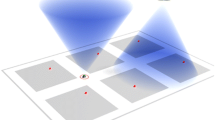Abstract
This paper deals with the problem of autonomously organizing the behavior of a multiagent system through a distributed approach based on open-ended natural evolution. We computationally simulate life-like dynamics and their evolution from the definition of local and low level interactions, as used in Artificial Life simulations, in a distributed evolutionary algorithm called ASiCo (Asynchronous Situated Coevolution). In this algorithm, the agents that make up the population are situated in the environment and interact in an open-ended fashion, leading to emergent states or solutions. The aim of this paper is to analyze the capabilities of ASiCo for obtaining specialization in the multiagent system if required by the task. Furthermore, we want to study such specialization under changing conditions to show the intrinsic self-organization of this type of algorithm. The particular task selected here is multi-robot collective gathering, due to the suitability of ASiCo for its application to real robotic systems.
Access this chapter
Tax calculation will be finalised at checkout
Purchases are for personal use only
Preview
Unable to display preview. Download preview PDF.
Similar content being viewed by others
References
Floreano, D., Mattiussi, C.: Bio-Inspired Artificial Intelligence: Theories, Methods, and Technologies. MIT Press (2008)
Prieto, A., Bellas, F., Caamaño, P., Duro, R.J.: A Complex Systems Based Tool for Collective Robot Behavior Emergence and Analysis. In: Corchado, E., Abraham, A., Pedrycz, W. (eds.) HAIS 2008. LNCS (LNAI), vol. 5271, pp. 633–640. Springer, Heidelberg (2008)
Duro, R.J., Bellas, F., Prieto, A., Paz-López, A.: Social Learning for Collaboration through ASiCo based Neuroevolution. Journal of Intelligent and Fuzzy Systems 22, 125–139 (2011)
Prieto, A., Bellas, F., Caamaño, P., Duro, R.J.: Solving a Heterogeneous Fleet Vehicle Routing Problem with Time Windows through the Asynchronous Situated Coevolution Algorithm. In: Kampis, G., Karsai, I., Szathmáry, E. (eds.) ECAL 2009, Part II. LNCS, vol. 5778, pp. 200–207. Springer, Heidelberg (2011)
Agogino, A., Tumer, K.: Efficient evaluation functions for evolving coordination. Evolutionary Computation 16(2), 257–288 (2008)
Nitschke, G., Schut, M., Eiben, A.: Collective Neuro-Evolution for Evolving Specialized Sensor Resolutions in a Multi-Rover Task. Evolutionary Intelligence 3(1), 13–29 (2010)
Baldassarre, G., Nolfi, S., Parisi, D.: Evolving mobile robots able to display collective behavior. Artificial Life 9(1), 255–267 (2003)
Bryant, B., Miikkulainen, R.: Neuro-evolution for adaptive teams. In: Proceedings of the Congress on Evolutionary Computation, pp. 2194–2201 (2003)
Watson, R., Ficici, S., Pollack, J.: Embodied evolution: Distributing an evolutionary algorithm in a population of robots. Robot. and Auton. Syst. 39(1), 1–18 (2002)
Eiben, A.E., Haasdijk, E., Bredeche, N.: Embodied, On-line, On-board Evolution for Autonomous Robotics. In: Symbiotic Multi-Robot Organisms: Reliability, Adaptability, Evolution, pp. 361–382. Springer, Heidelberg (2010)
Karafotias, G., Haasdijk, E., Eiben, A.E.: An algorithm for distributed on-line, on-board evolutionary robotics. In: Proceedings of the 13th Annual Conference on Genetic and Evolutionary Computation (2011)
Bredeche, N., Montanier, J.M., Liu, W., Winfield, A.: Environment-driven Distributed Evolutionary Adaptation in a Population of Autonomous Robotic Agents. Mathematical and Computer Modelling of Dynamical Systems (2011)
Elfwing, S., Uchibe, E., Doya, K., Christensen, H.: Darwinian embodied evolution of the learning ability for survival. Adaptive Behavior - Animals, Animats, Software Agents, Robots, Adaptive Systems 19(2), 101–120 (2011)
Montanier, J.-M., Bredeche, N.: Embedded Evolutionary Robotics: The (1+1)-Restart-Online Adaptation Algorithm. In: Doncieux, S., Bredèche, N., Mouret, J.-B. (eds.) New Horizons in Evolutionary Robotics. SCI, vol. 341, pp. 155–169. Springer, Heidelberg (2011)
Knudson, M., Tumer, K.: Coevolution of heterogeneous multi-robot teams. In: Proceedings of the 12th Annual Conference on Genetic and Evolutionary Computation, pp. 127–134. ACM, New York (2010)
Author information
Authors and Affiliations
Editor information
Editors and Affiliations
Rights and permissions
Copyright information
© 2012 Springer-Verlag Berlin Heidelberg
About this paper
Cite this paper
Trueba, P., Prieto, A., Bellas, F., Caamaño, P., Duro, R.J. (2012). Self-organization and Specialization in Multiagent Systems through Open-Ended Natural Evolution. In: Di Chio, C., et al. Applications of Evolutionary Computation. EvoApplications 2012. Lecture Notes in Computer Science, vol 7248. Springer, Berlin, Heidelberg. https://doi.org/10.1007/978-3-642-29178-4_10
Download citation
DOI: https://doi.org/10.1007/978-3-642-29178-4_10
Publisher Name: Springer, Berlin, Heidelberg
Print ISBN: 978-3-642-29177-7
Online ISBN: 978-3-642-29178-4
eBook Packages: Computer ScienceComputer Science (R0)




